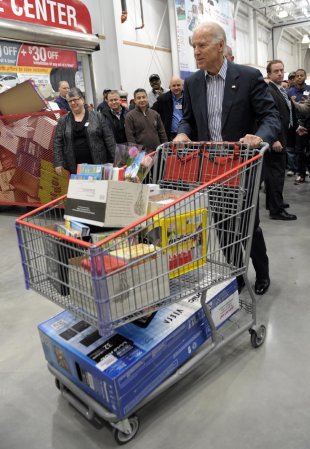
Mohammed Salem / Reuters
Palestinians rest as a worker repairs a smuggling tunnel dug beneath the Egyptian-Gaza border in Rafah, in the southern Gaza Strip on Monday. Knee-deep in craters carved out by Israeli airstrikes, Palestinians wielded shovels and planks to reopen tunnels used to smuggle in goods from Egypt to Gaza, as international aid agencies raced to replenish Gaza's supplies.
By NBC News staff and wire reports
Palestinians wielded shovels and planks Monday to reopen tunnels used to smuggle in goods from Egypt to the Gaza Strip after Israel's eight-day offensive against Hamas.
Israeli airstrikes have heavily targeted the network of tunnels, which smugglers use to bring in various items ? including food, fuel, construction materials and weapons ? to Gaza's 1.6 million residents.
Residents along the Egypt-Gaza border say that smugglers and tunnel owners are still inspecting the damage but that many of the tunnels still operate, though at reduced capacity, according to The Associated Press.
An Egyptian security official, speaking to the AP on condition of anonymity because he was not authorized to talk to the media, estimated that as of Sunday half the tunnels were not functioning.
PhotoBlog: Gazans work to reopen tunnels bombed by Israel
The tunnels were developed as a way for Palestinians in Gaza to sidestep Egyptian and Israeli restrictions.
Though technically illegal, the tunnels have until recently been tolerated to varying degrees on the Egyptian side of the border.
Lifeline
While many Gazans depend on the tunnels for basic food and supplies, the underground facilities have also been crucial to arming Hamas and other militant groups.
"You can smuggle weapons, have people going in and out," Benedetta Berti, a research fellow at the Institute for National Security Studies in Tel Aviv, recently told USA Today. "Security on the border and monitoring tunnels ... has to be done."

Bernat Armangue / AP
Israel's military said it had accomplished its objectives while Hamas claimed victory after the two sides exchanged deadly airstrikes and rocket attacks for over a week.
According to an August report by the International Crisis Group, between $500-700 million in goods are estimated to pass through the tunnels each year. The Hamas government has charged a tax of around 14.5 percent since the beginning of 2012, the report said. In 2011 alone, 13,000 cars were estimated to have come through the tunnels.
Some smugglers have made a fortune off the smuggling.
"Eight hundred millionaires and 1,600 near-millionaires control the tunnels at the expense of both Egyptian and Palestinian national interests," Palestinian President Mahmoud Abbas, who leads the Palestinian Authority in the West Bank, told The Economist.
Thousands of other workers make a living transporting goods back and forth through the tunnels, reports say.
As of late 2010, around 1,000 tunnels were in operation along the border, the nonpartisan Congressional Research Service said in a report.
ANALYSIS: What Gaza crisis taught Israel about Iran
Hamas began a dramatic expansion off the tunneling network following Israel's 2005 withdrawal from the coastal territory, analysts say. The Islamist group, which Israel and the United States classify as a terrorist group, came to power in Gaza in 2007.
"Under the closure regime aimed at undermining Hamas's control over the territory, the tunneling network has become Gaza's primary economic engine and mode of rearmament for militants," the CRS report said.
The tunnels are believed to be of a relatively high quality of engineering and construction, with some including electricity, ventilation, intercoms, and a rail system, according to the report.
ARCHIVAL VIDEO from Jan. 21, 2009: As Israeli troops finish their withdrawal from Gaza, smuggling tunnels into the territory are filling back up with contraband. NBC's Richard Engel reports.
The Iran link
Many of the weapons smuggled into Gaza appear to have originated in Iran, experts say.
Iran's fingerprints on Hamas weaponry, but role in Israel-Gaza crisis murky
The Israeli military released footage earlier this month that it said showed that many of Hamas' weapons, such as the Fajr-5 missiles, came from Iran.
The Shiite-led government in Iran has found common cause with the Sunni Hamas over a mutual foe, Israel, but experts agree that its influence is often indirect.
Still, according to a 2009 cable obtained by WikiLeaks, Israeli intelligence told a U.S. official that Israel's air attacks on Gaza's tunnels were "part of a bigger campaign to address the main issue of Iranian support to Hamas."
For example, Israel said the Iranians had developed a version of the 122mm rocket specifically for Hamas: the weapon "came in four pieces that could fit through narrow tunnels and be reassembled in Gaza."
Despite troubles at home, Egypt's Morsi is pivotal player in Mideast
Israel has promised to ease its blockade on Gaza as part of a cease-fire last week that ended the intense fighting. But as negotiations inch forward, no timeline has yet been set for the lifting the restrictions.
Under its new Islamist government, Egypt has moved to reduce smuggling in the tunnel by sealing off the entrances on its side of the border.
Complete World coverage on NBCNews.com
Egypt and Israel have blamed a recent surge in lawlessness on the Egyptian side of the Gaza border in large part to smuggling through the tunnels.
In August, the Egyptian army launched a crackdown on militants in the Sinai Peninsula after an attack killed 16 Egyptian police officers.
The Associated Press and Reuters contributed to this report.
More world stories from NBC News:
Follow World News from NBCNews.com on Twitter and Facebook
Source: http://worldnews.nbcnews.com/_news/2012/11/26/15454998-gazans-move-quickly-to-rebuild-bombed-tunnels-to-bring-in-food-weapons?lite
the misfits hook troy miracle andy whitfield kennedy demi moore


 ??This app is designed for both iPhone and iPad.
??This app is designed for both iPhone and iPad.







 Think of a time when you?ve felt very sick, maybe a case of pneumonia, a bad bout of the flu, or a more serious illness.
Think of a time when you?ve felt very sick, maybe a case of pneumonia, a bad bout of the flu, or a more serious illness.